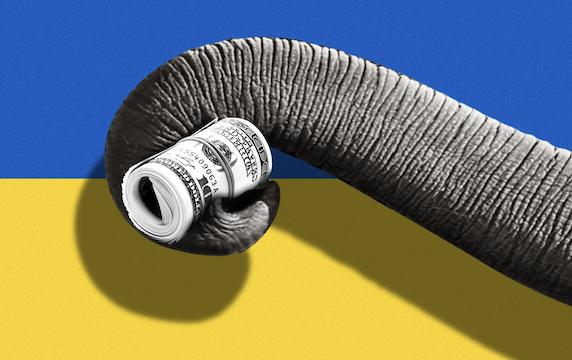Does the Republican party turn into a loser’s caucus? Let me begin.
In recent months several Republican politicians that count voter support in the hundreds of thousands (presumably) have contended we should pull back from our nation’s support of Ukraine in the war that Russia started. Most notably Florida Governor Ron DeSantis first noted his objections by calling the war a “territorial dispute”. He later rolled back his characterization. And, of course, Tucker Carlson the defrocked Fox News commentator, was frequently featured by Russian media as its useful idiot.
Of course, Former President, Donald Trump as always gets the loudest word as he contended, in a CNN Town Hall meeting, that if he is elected, he would end the war in 24 hours. I’ll withhold comment to avoid invective.
Let me put that context aside for a moment and comment on the unfolding race to win the Republican nomination for President in 2024. Depending on which pundit has a microphone in one hand and the latest poll in another, you could be led to conclude that Trump has the nomination locked up. Political history suggests that the pundits are not very good poker players. A lot of front runners end up losing. As in poker there are hole cards (hidden cards) before each player.
As noted, polls are the straws would-be prophets grab. The phone polls are a snapshot. They say that if the vote is held tomorrow this is how those several thousand people who were called believe they would vote. Of course, most of the contenders are either barely known or not known at all. Trump, well, he is known well beyond what he would prefer.
The more consequential calculating is being done by political professionals and large check donors. And they are making it possible for up to six candidates and maybe more to run against the presumed nominee. The list of announced or soon to announce or potentially to throw their hat in include: Mike Pence, Ron DeSantis, Nikki Haley, Tim Scott, Asa Hutchinson, Vivek Ramaswamy, Chris Christie, Chris Sununu and Glenn Youngkin. If Trump’s hand was a lay down, this would not be happening. Maybe he will win but the odds are far from settled.
As an aside, it is past time for Democrats to show they have talent from which to choose a plausible leader of the free world. If Kamala Harris is their party’s best choice for succession, it is in trouble. Given President Joe Biden’s age and infirmities, many voters will believe his Vice-Presidential running mate will become President.
Most of the above noted Republican candidates are going through a quite difficult screening process. They must persuade party activists in the early primary states that they can win. And they must persuade people who can write seven-figure checks that their contributions are warranted.
Beyond the early skirmishing the real race for the nomination will be decided by voters in Iowa, New Hampshire, and South Carolina. There will be a lane for at least one and maybe two candidates to rival Trump as those primaries end. And the one thing that to me is certain is that Trump’s final numbers in those states will show a quite measurable decline from where he is in today’s polls. Running ahead has its downsides—as polls subtract increments of support, strength ebbs.
The electoral process has the potential of turning the GOP, which has had a poor track record in recent elections, into a successful Party. This is, in part, a gift of expectations. Democratic leaders are assuming Trump will be the Republican nominee and that in a rematch Biden will win again because swing voters do not like Trump. One question Democratic leaders might ponder: Who would they choose to run if they anticipated Senator Tim Scott would get the Republican nomination? This is a substantive not just a tactical question.
Back to context. Today the political digerati are certain that the abortion issue will exert a powerful influence on the voting outcome in 2024 and maybe they are right. But if the Party that lost its momentum in 2018 is to succeed in 2024, its leader will have to understand and voice the immeasurable stake the United States has in the European war. A reversal of the Ukraine policy might not be as chaotic as the Afghanistan withdrawal, but the consequences would be far more damaging.
Will the Party of Ronald Reagan bend to communist aggression? Naked aggression? Will the Republican leader invite China’s Xi to believe America will be ambivalent about Taiwan? Will the Republican party abandon America’s position in world affairs? Because that is exactly what will happen if we replace a resolute stand with irresolution, thus handing to China the opening it wants.
China’s current peace initiative is Putin’s. Putin wants territory; China will insist that ceding territory to Russia is an irreversible condition for peace. And Putin badly wants an end to his misbegotten war which has drained Russia of standing, currency reserves, trust, economic well-being and military strength.
Returning to America, its political underpinnings are fragile. Laws underwrite a left and right monopoly—the two-party structure. It is for this reason and others that America needs a strong Republican party, not a loser’s caucus.
Al Sikes is the former Chair of the Federal Communications Commission under George H.W. Bush. Al writes on themes from his book, Culture Leads Leaders Follow published by Koehler Books.


Write a Letter to the Editor on this Article
We encourage readers to offer their point of view on this article by submitting the following form. Editing is sometimes necessary and is done at the discretion of the editorial staff.